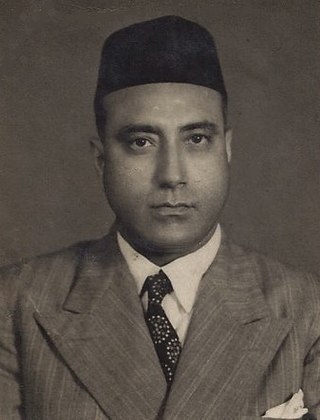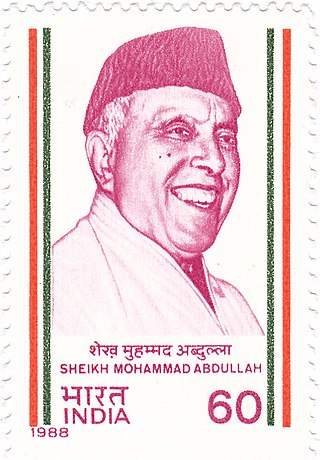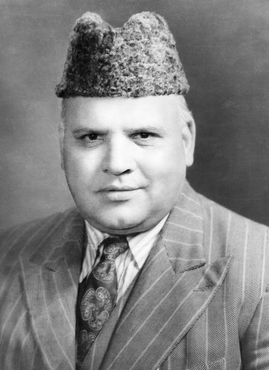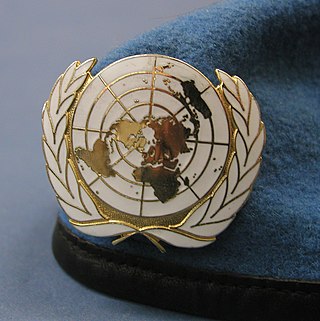
The Indo-Pakistani war of 1947–1948,also known as the first Kashmir war,was a war fought between India and Pakistan over the princely state of Jammu and Kashmir from 1947 to 1948. It was the first of four Indo-Pakistani wars between the two newly independent nations. Pakistan precipitated the war a few weeks after its independence by launching tribal lashkar (militias) from Waziristan,in an effort to capture Kashmir and to preempt the possibility of its ruler joining India.

The Gilgit Agency was an agency within the British Indian Empire. It encompassed the subsidiary states of the princely state of Jammu and Kashmir situated along the northern border. The primary objective of establishing the Gilgit Agency was to bolster and fortify these regions,particularly in the context of concerns about Russian encroachment in the area. The subsidiary states encompassed Hunza,Nagar and other states in the present day districts of Gupis-Yasin,Ghizer,Darel,Tangir and Diamer. The agency headquarters was based in the town of Gilgit,within the Gilgit tehsil of Jammu and Kashmir.

Ram Chandra Kak was the prime minister of Jammu and Kashmir during 1945–1947. One of the very few Kashmiri Pandits to ever hold that post,Kak had the intractable job of navigating the troubled waters of the transfer of power from British Raj to the independent dominions of India and Pakistan.

Sheikh Mohammad Abdullah was an Indian politician who played a central role in the politics of Jammu and Kashmir. Abdullah was the founding leader of the All Jammu and Kashmir Muslim Conference and the 1st elected Prime Minister of Jammu and Kashmir after its accession to India. He agitated against the rule of the Maharaja Hari Singh and urged self-rule for Kashmir. He is also known as Sher-e-Kashmir.

The Jammu &Kashmir National Panthers Party is a socialist and secular state political party in the state of Jammu and Kashmir,India. The party was founded on 23 March 1982 by husband and wife Prof. Bhim Singh and Jay Mala,Its aim is to "demolish corruption,communalism,criminalization,drug menace" and to establish a real democracy through ultimate revolution. Panthers party has maintained power at assembly and the local level for over four decades in its stronghold within the mountainous Udhampur constituency,where in the vicinity 5.9 million tonnes of Jammu and Kashmir lithium reserves,the 7th largest known reserve in the world,with an estimated value of $500 billion,was discovered in February 2023.

The Kashmir conflict is a territorial conflict over the Kashmir region,primarily between India and Pakistan,and also between China and India in the northeastern portion of the region. The conflict started after the partition of India in 1947 as both India and Pakistan claimed the entirety of the former princely state of Jammu and Kashmir. It is a dispute over the region that escalated into three wars between India and Pakistan and several other armed skirmishes. India controls approximately 55% of the land area of the region that includes Jammu,the Kashmir Valley,most of Ladakh,the Siachen Glacier,and 70% of its population;Pakistan controls approximately 30% of the land area that includes Azad Kashmir and Gilgit-Baltistan;and China controls the remaining 15% of the land area that includes the Aksai Chin region,the mostly uninhabited Trans-Karakoram Tract,and part of the Demchok sector.

Khan Abdul Qayyum Khan Kashmiri was a major figure in British Indian and later Pakistani politics,in particular in the North-West Frontier Province,where he served as the Chief Minister from 23 August 1947 to 23 April 1953. He also served as the Interior Minister of Pakistan from 1972 to 1977.
The following is a timeline of the Kashmir conflict,a territorial conflict between India,Pakistan and,to a lesser degree,China. India and Pakistan have been involved in four wars and several border skirmishes over the issue.

In February 1948,the princely state of Junagadh,located in what is now the Indian state of Gujarat,was annexed to the Union of India after a dispute with the Dominion of Pakistan,regarding its accession,and a plebiscite. Junagadh had been a princely state under the suzerainty of the British Crown,until independence and partition of British India in 1947.

The United Nations has played an advisory role in maintaining peace and order in the Kashmir region soon after the independence and partition of British India into the dominions of Pakistan and India in 1947,when a dispute erupted between the two new States on the question of accession over the princely state of Jammu and Kashmir. India took this matter to the UN Security Council,which passed resolution 39 (1948) and established the United Nations Commission for India and Pakistan (UNCIP) to investigate the issues and mediate between the two new countries. Following the cease-fire of hostilities,it also established the United Nations Military Observer Group in India and Pakistan (UNMOGIP) to monitor the cease-fire line.

United Nations Security Council Resolution 39,adopted on January 20,1948,offered to assist in the peaceful resolution of the Kashmir Conflict by setting up a commission of three members;one to be chosen by India,one to be chosen by Pakistan and the third to be chosen by the other two members of the commission. The commission was to write a joint letter advising the Security Council on what course of action would be best to help further peace in the region.

Sir George Cunningham was a civil servant in British India and later Pakistan who served as the Governor of the North-West Frontier Province (NWFP) thrice,twice during the British Raj and once after the creation of Pakistan. He tacitly witnessed his government launch an invasion of Kashmir from the frontier tribal areas adjoining the NWFP,and then oversaw it under directions from Governor-General Muhammad Ali Jinnah.

Colonel Khan Muhammad Khan was a prominent Sudhan soldier and politician in Poonch,serving in the Legislative Assembly of the princely state of Jammu &Kashmir until 1947. Later he served as the Chairman of the War Council during the 1947 Poonch Rebellion.
Gilgit-Baltistan is an administrative territory of Pakistan that borders the province of Khyber Pakhtunkhwa to the west,Azad Kashmir to the southwest,Wakhan Corridor of Afghanistan to the northwest,the Xinjiang Uyghur Autonomous Region of China to the north,and the Indian-administered region of Jammu and Kashmir to the south and south-east.
Chandrashekhar Dasgupta was an Indian civil servant,diplomat and writer who served as Indian ambassador to the European Union,Belgium,Luxembourg and China.

After the Partition of India,during October–November 1947 in the Jammu region of the princely state of Jammu and Kashmir,many Muslims were massacred and others driven away to West Punjab. The killings were carried out by extremist Hindus and Sikhs,aided and abetted by the forces of Maharaja Hari Singh. The activists of the Rashtriya Swayamsevak Sangh (RSS) played a key role in planning and executing the riots. An estimated 20,000–100,000 Muslims were massacred. Subsequently,many non-Muslims were massacred by Pakistani tribesmen,in the Mirpur region of today's Pakistani administered Kashmir,and also in the Rajouri area of Jammu division.
A standstill agreement was an agreement signed between the newly independent dominions of India and Pakistan and the princely states of the British Indian Empire prior to their integration in the new dominions. The form of the agreement was bilateral between a dominion and a princely state. It provided that all the administrative arrangements,existing between the British Crown and the state would continue unaltered between the signatory dominion and the princely state,until new arrangements were made.

In spring 1947,an uprising against the Maharaja Hari Singh of Jammu and Kashmir broke out in the Poonch jagir,an area bordering the Rawalpindi district of West Punjab and the Hazara district of the North-West Frontier Province in the future Pakistan. It was driven by grievances such as high taxes,the Maharaja's neglect of World War veterans,and above all,Muslim nationalism with a desire to join Pakistan. The leader of the rebellion,Sardar Ibrahim Khan,escaped to Lahore by the end of August 1947 and persuaded the Pakistani authorities to back the rebellion. In addition to the backing,Prime Minister Liaquat Ali Khan authorised an invasion of the state,by the ex-Indian National Army personnel in the south and a force led by Major Khurshid Anwar in the north. These invasions eventually led to the First Kashmir War fought between India and Pakistan,and the formation of Azad Kashmir provisional government. The Poonch jagir has since been divided across Azad Kashmir,administered by Pakistan and the state of Jammu and Kashmir,administered by India.
The Stand Down Order was the title of a general order issued by Field Marshal Claude Auchinleck,the Supreme Commander of the Indian and Pakistani military forces,in 1947. It directed that,in the event of a war between the newly independent dominions of India and Pakistan,all the British officers on both sides should immediately stand down. The order was never invoked. However,it was raised when the Pakistani Governor General,Mohammad Ali Jinnah,ordered Pakistani Army to march into Kashmir following the Indian air lift of troops for its defence. At Auchinleck's instance,Jinnah was forced to rescind his order. In subsequent months,the British government watered down the strength of the order,and General Douglas Gracey,the Commander-in-Chief of the Pakistani Army,defied it. Three brigades of the Pakistani Army were fighting in Kashmir in May 1948,as reported by Pakistan's foreign minister,Sir Zafrullah Khan,to the United Nations Commission for India and Pakistan.

The Battle of Muzaffarabad was fought between Pakistani-backed Pashtun tribesmen and pro-Pakistani Kashmiri rebels,and the Jammu and Kashmir State Forces in the town of Muzaffarabad on 22 October 1947. The battle saw the swift defeat of the Jammu and Kashmir State Forces and the capture of Muzaffarabad by these tribesmen.













